By Tracy G. Cassels
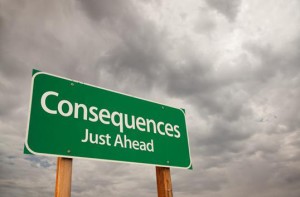 I’m a big fan of natural consequences. But sometimes natural just doesn’t do it – like when my daughter decides to throw her toys at me – sure, she sees me sad and I will not play with her, but that doesn’t quite seem to curb it, especially when she’s angry and threw it in order to hurt me. Now before anyone goes calling her a brat, let me remind you she’s 3 and that this is incredibly normal behaviour for a 3 year old, and although we don’t spank her or send her to a corner or room, we also don’t “let it slide”. And here are where logical consequences come into play.
I’m a big fan of natural consequences. But sometimes natural just doesn’t do it – like when my daughter decides to throw her toys at me – sure, she sees me sad and I will not play with her, but that doesn’t quite seem to curb it, especially when she’s angry and threw it in order to hurt me. Now before anyone goes calling her a brat, let me remind you she’s 3 and that this is incredibly normal behaviour for a 3 year old, and although we don’t spank her or send her to a corner or room, we also don’t “let it slide”. And here are where logical consequences come into play.
First, let’s define a logical consequence: It is one which makes sense as a consequence given the particular action. So in the case of my daughter throwing her toys, for us, we simply take that toy away for a period of time. If she can’t play gently with the toy, the toy goes away. It’s logical. However, if we decided instead to not read a story at bedtime as a consequence it wouldn’t be so logical because how would she make the connection between an action while playing during the day, and our taking something away at night? She wouldn’t and the point of helping her learn would fail. This checklist from Education.com should help:
Why does this logic matter? Well, from the point of view of the child, it helps them internalize the rules and morals that we are attempting to teach them. Research has shown that when a consequence “fits the crime” (so to speak), children learn more and develop a greater moral orientation than when punishments or consequences seem illogical (e.g. The second benefit is that it provides the child with choices. Rudolf Dreikus was one of the main proponents of logical consequences in the classroom and gives these examples of how it works in that environment[2]: Max is a second grader who for a couple of weeks was constantly out of his seat, leaning on his desk, and doing his work from a half-standing position. His teacher finally asked him whether he preferred to stand or sit while doing his work. Max said that he would prefer to stand. The teacher explained to him that he would no longer need a seat and that his chair could be used somewhere else in the school. Max’s chair was immediately removed, and he had to stand up for the rest of the day. The following day, at the beginning of the period, Max was asked whether he preferred to stand or sit for the day. He said that he preferred to sit. His chair was replaced. Max no longer tried to do his schoolwork from a half-standing position. One day a group of junior high school students seemed particularly restless. Several students were talking rather belligerently and interrupted the teacher’s lesson repeatedly. Finally, the exasperated teacher informed the students that she would be in her office at the back of the classroom reading, and that when they were ready to have her teach, they could come get her. The teacher was fearful as she started reading her book, but in a few minutes two serious-faced youngsters came in and said, “We’re ready now—if you will come and teach us.” After this incident, whenever the class became unruly and the teacher appeared annoyed, someone would say, “Be careful, or we’ll lose our teacher again.” The importance of choice can never be understated. Forcing behaviour will not instill in children the self-motivation we hope for. But when they know the logical consequence, they can make a choice for themselves when they are ready. Like Max in the example above, my daughter is asked if she wants her toy that was taken away or if she thinks she’ll throw it again. Her choice. And she knows what will happen if she does throw it (or another) again. Do I expect her to never throw a toy again? Absolutely not, but at least I know she’s learning to make the choices herself, and with time and maturity, the choice not to throw it at someone will become easier. Sometimes this is the hardest part because we so badly want a specific behaviour right now. But that’s our problem to work on, not our child’s, and often our kids will surprise us, even if it takes a bit of patience on our behalf. There’s also an additional benefit to the use of logical consequences that our family just happened upon: We no longer need to feel frustrated, helpless, or angry (which was rare, but did happen). When we were only focusing on natural consequences, we had times when we got angry and annoyed if the behaviour continued . You see, our natural consequence was that we don’t play if she is hitting/throwing/etc. (because who wants to do that?) and we’d talk to her about why she was acting this way, how we could help, why her actions hurt, what she could hit (the bed or sofa or pillows), and then redirect. But sometimes that really didn’t help her and we’d get incredibly annoyed by it. It usually led to yelling – arguably, this was a natural consequence (others would yell too in the real world), but not one I wanted for my daughter. That was not what we wanted, but it’s hard to stay calm when you’ve just been belted in the face with a toy for the second time and you don’t have a set reaction that makes sense outside of walking away which is often more of a punishment to us as we’re trying to enjoy ourselves where we are and we don’t do time-outs so sending our daughter away was not an option. Once we all decided upon and spoke about the logical consequences though, we could stay calm. The first time she hit me with a toy hockey stick it hurt, but I wasn’t angry (I never am the first time though). I went to take the hockey stick – which she did hold on to for dear life at first – and reminded her we had agreed on the consequence. After we spoke about it, she let go of the stick, I put it on top of the bookshelf and faced my now deeply upset daughter. Seeing as she’d had her consequence, I could also now focus on comforting her and the emotional connection that has always been a part of our experience. I held her and told her I understood that she was upset but that this is what happens when we use our toys to hurt other people. I reminded her she was allowed to be angry at people and feel how she felt, but that we have to find a better way to express it. She cried and then calmed down, then tried to get chairs to get her stick, but we knew she couldn’t reach (which led to a few more tears and a bit more comfort). This first time, we reminded her she’d get the choice to have it back the next day and we have since decided to let her have her toys back when she asks and is ready for them, after we’ve talked, because we realized keeping it away long *is* punishment pure and simple. Play continued and she went to bed happy, cuddling with mom, and a clear sense of what to expect. The next day I offered her the hockey stick back asking if she wanted it and would not hit people with it. She said yes and when I gave it to her I got a very honest, “Thank you Mommy.” It was a completely different scenario than we had encountered before. Allowing us to stay calm and offer comfort while also helping our daughter learn what happens when she hurts people was invaluable to us as a family. Some people may choose to stick with natural consequences only and if it works for your family, wonderful! But for some of us, we need more because all the emotional connection in the world ain’t working. This doesn’t mean we don’t acknowledge the completely normal nature of the behaviour, but rather that we pick consequences that are in line with that. We don’t “punish”, but make sure that whatever happens logically follows the initial act and we leave these for times when people may really get hurt; that the “natural” consequence outside our home could be much worse. Of course, there will be acts that will only require natural consequences. For example, as much as I may think my daughter needs to wear a coat, if she refuses, that’s on her. She’ll either get cold or she won’t and if she’s cold she’ll ask for her coat. What good does having a logical consequence there do? I don’t wear a coat when I’m warm so why should she? And sometimes preventative acts will be best. For example, when offering my daughter food, making sure her options are healthy ones (most of the time!) so she can choose her food without me having to worry she’s going to focus solely on candy and crap. But sometimes, just sometimes, we need logical consequences too, and they can be hugely beneficial for all involved. [One additional though, though, is that if you know the reason for your child’s behaviour — they are sad, hungry, tired, etc. — enforcing a logical consequence isn’t logical. Focus on the underlying problem and fix that.]
It’s all about your toolkit and far too often I hear of parents hesitant to use logical consequences because they fear it isn’t “gentle” or is more “punishment”. It’s not. And if you’re like our family, it can be even more gentle than sticking with what’s natural. To read up on logical consequences, you can see a quick guide here. [Image Credit: Lipstick and Politics]

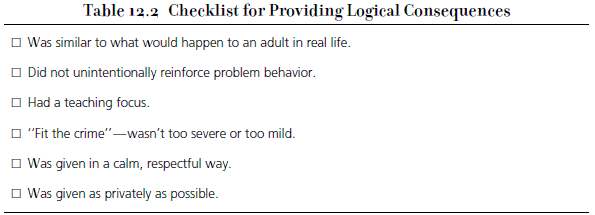
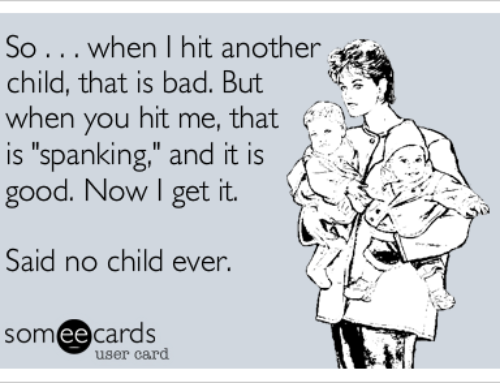
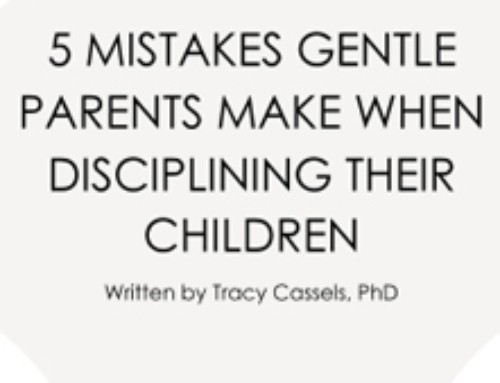

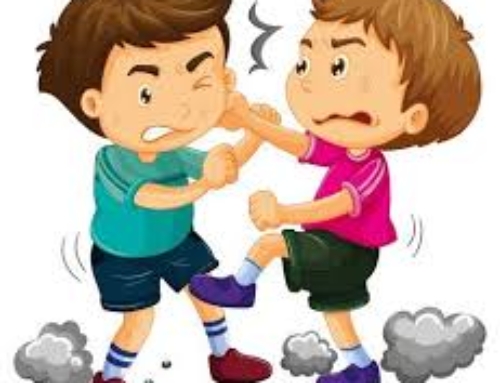

I agree that we need to control certain elements in the environment to provide for safety but I think equating the “consequence” with kids internalizing positive behaviors is completely different and not exactly true.
In the example with your daughter hitting, it seems the long-term goal is self-regulation. Something that will come with time and patience. You said the consequence provided something unexpected
” We no longer need to feel frustrated, helpless, or angry. When we were only focusing on natural consequences, we had times when we got angry and annoyed if the behaviour continued.”
But at this age, the behavior is likely to repeat until she gets a bit older. And as with anything – if you don’t address the need (not redirect but go behind the behavior – not with logic but with emotional connection) – behavior will escalate. As you said, the consequence ensured that YOU didn’t get angry, but I’d question whether it was the consequence or your constant attention and love which will ultimately help your daughter adapt and find ways to cope and control her impulses.
I’m not judging your choices – just the conclusion. In the case of the older child who couldn’t sit still — using dominance and disguising it as a choice is even more questionable as having any real long-term effect.
A child who can’t sit in his seat probably has attention troubles, maybe some anxiety or is just a typical child who needs to move as he learns. He may need more outside time, mindfulness tools, an altered schedule or a fidget toy to help him keep still and focus – he doesn’t need to be tricked into making a choice that he thought would help him meet his needs only to be confronted with a punishment (his choice).
A choice between sitting and standing and then forcefully requiring him to stand for the remainder of class is likely to bring resentment and a blow to his self-esteem regardless of the short-term compliance we may see.
I’m all for controlling the environment to keep kids safe as they practice their emerging skills because they will fail – and we need to be responsible for setting up a scaffolding of support for when they can’t manage their bodies and feelings but I fail to see how being logical with children who are acting from an emotional place is anything but a way to make parents feel like they are having an influence.
Maturity is something we have to have faith in. Is using consequences the proof we need to know our discipline is working? Is it our way to make the child pay because we believe they need to be “disciplined”
To say to a child “This is the result of your actions” usually comes with a denial of responsibility from the parent — a “You left me no choice” attitude — rather than saying – I’m doing this to help you. The child sees it as a take-away no matter how the parent intends it. Does this build the skill we hope for?
We may need to take away a toy that is being thrown if we can’t be there to supervise and take time to address the need driving the behavior.
Sometimes we may need to bring a child inside if they run in the street, or restrict our teen to drive only with an adult present if they don’t bring home the car on time.
But these consequences are to keep the child safe – not to “teach” a lesson.
I think when we say we are using logical consequences to teach our kids – we are fooling ourselves. We can use consequences as preventative safety measures but I disagree that they are teaching tools.
Thanks for allowing me to share my thoughts. I prefer non-punitive discipline but I always enjoy your articles.
Kind regards,
Lori @TEACH through Love
Lori,
I never said the consequence provided something *un*expected, but EXPECTED. That was part of the choice for her. And I can say that we start off always loving, caring, and empathizing with her – that’s key for me. We’ve talked about why she might be throwing and how we can fix it or simply take our time to calm down and cuddle. I also agree, as I said, that at this age, she will continue and I will continue to give her the choice (always verbalized AHEAD of time). We try to use preventative measures most of the time like making sure she’s not hungry or tired, and if we see the trigger for the behaviour, then it changes what the consequences are. One has to take in ALL information before acting, of course!
I disagree that you aren’t helping teach though. It may not be the way you want to teach your child, and that’s okay, but in my studies and in looking historically and cross-culturally, I see that there are times when, as an adult with a fully formed prefrontal cortex, I’m going to be “in charge”. There may be elements my daughter doesn’t like and they are always up for discussion and consideration of the facts and sometimes I will change my mind. I was aware that one option is to remove all hard toys until she’s “mature” enough not to throw them – removing the idea that she could hurt someone. I don’t like that option because I find it unhelpful to not have her learn self-regulation with the objects present. But as I learn to self-regulate in other realms as an adult by removing offending objects when frustrated/feeling weak (in the case of yummy bread). Again, of course, this is included in how we approach this with our daughter. If she’s feeling frustrated, we approach and talk about possibly putting the toy away for a bit until she’s calm. Often that works and that’s great.
What I would ask is what you would do in the similar situation (and I honestly want to know)? Knowing that emotional connection is ALWAYS there and was there regularly whenever this happened before and is there now.
Cheers,
Tracy
p.s. The one thing that gets me with the “no consequences” view is that it does presuppose parents aren’t being emotionally available or connected and I know far too many families – ours included – where that is NOT the case at all. Families who always go first to trying to connect and empathize and talk things out and when someone says the reason it isn’t working is that you aren’t emotionally connected, it kinda pisses me off. My daughter ALWAYS had my constant love and attention (and yes, even when I get angry, I make it clear I love her in my anger and will be there) and most of the time her actions are not directed at me but others and thus I don’t get angry at all, but focus on the love and attention and reasons why she might be acting out (including time-ins where we get to cuddle and figure it out) and it still didn’t work as well as simply knowing that if she throws a toy at someone, it goes away, even though she’s allowed to feel angry and we talk of different ways to express our anger.
You might want to read this article:
http://www.littleheartsbooks.com/2013/02/10/the-problem-with-punishment/
The question becomes – are logical consequences “punishments”. I don’t think they are at all.
Hi Tracy – When I said unexpected – I was referring to the benefit you named.
—–“There’s also an additional benefit to the use of logical consequences that our family just happened upon: We no longer need to feel frustrated, helpless, or angry” —-
I thought it said unexpected – but maybe I just inferred that from when you said —” our family just happened upon” – Happened upon – unexpected…
But feeling frustrated or helpless was not due to your daughters non-compliance or inability to manage her behavior – but your own skill in managing your emotions.
So that’s why I said the consequence was beneficial for parents – many people feel like their limits have more impact with a consequence.
but what’s the risk/benefit to our kids and our relationship? In your example – likely none, right?… but the example of the school child – much more risk.
And over over time, how does that build up? Parents use these behavior controls with the hopes that they bring long-term change – and after time – they start to wear at the relationship.
As a child grows older – those logical consequences will not provide reflection and awareness but resentment. And they will need to be harsher to have any impact.
“Are logical consequences punishment” — depends on how and WHY they are served.
I think that an adult-imposed consequences are punishment. They are imposed to point out a mistake or to make the child “aware of (pay for) their mistake”
I don’t think they are always received by the child in ways that we intend. Again – this isn’t judgment . I just don’t think that consequences serve learning.
Natural consequences are natural – if a child yells at someone – that person probably won’t be responsive to speaking with you. That’s natural response and not adult imposed.
Taking away a privilege for the day could be logically connected to the outburst but it’s not a natural outcome – it is determined by the parent.
It is not contributing to the skill development — self regulation. But giving the child a stress ball, roughhousing, coloring to get the feelings out – and getting to the feelings/needs driving the hitting (play, connection, attention, to be heard, to be acknowledged, anxiety, need for more stimulation etc) is what will build the skill.
All behavior is purposeful. Even hitting.
—-“ps. The one thing that gets me with the “no consequences” view is that it does presuppose parents aren’t being emotionally available or connected” —-
I would never presuppose that people aren’t being emotionally available – that is why I mentioned that YOUR connection was the bigger influence than the consequence you imposed.
I just think it’s more effective to expect competence but not obedience. Expecting obedience is a dead-end street.
What would I do in similar situations? I can’t really answer that because as you know every situation/child/temperament is different. There is no magic answer.
But when you say “what would I do”
Do you mean – what would I do to get compliance? Because that’s different. I don’t think about compliance as much as I think about strengthening the relationship ( because that’s where my influence is) and the skill-building by offering/modeling/practicing coping strategies – not necessarily in the moment of conflict.
Short-term compliance isn’t worth it to me. I want to keep focused on the long-term goal – regulate my own emotions and address needs as I help the child self-regulate. There is no perfect way to relate to your child.
I just don’t use punitive consequences with kids when they don’t comply — because compliance doesn’t serve our kids in the future.
Especially under 6 – it’s going to take a lot more maturity before those kids can always meet their needs without expressing them through their bodies. So many things can contribute to aggression in young kids. Taking away something the child enjoys – even doing it kindly – isn’t instilling a lesson in self-regulation. It’s a lesson in power.
Some kids are hitters, some are more passive – neither needs to be treated punitively in my view.
Again – no judgment. I’m not judging the use of consequences – I just disagree with the conclusion that they help kids learn.
Best regards,
Lori
ps. if you’d like to know more – because obviously it’s hard to have a real conversation in the comments 🙂 – i’d be happy to offer you access to my current 8week series to review on your blog if you are interested.
Lori,
I definitely hear what you’re saying and I’ve read lots of it before. But here’s what gets ignored for me – you are focusing solely on the self-regulation aspect of what my daughter needs to learn. I am not. I am also concerned with her learning perspective-taking, cultural expectations, and how to consider outcomes not just for the moment but for everyone (the whole do unto others as you would have done unto you idea, in a crude way to put it). It is my job to help her develop all of these aspects and sometimes that does mean imposition of something I have decided and that is why I don’t feel it’s punishment because punishment to me is something handed down with no learning benefits.
In the case of the toys, she has to learn how her actions affect me and taking away the toy until she’s calm enough to play with it shows her how much that hurt me. And because we spoke of what she would want to happen if someone did it to her, she’s learning that her behaviour doesn’t exist in a vacuum – that we as a society, a family, any group, set up rules we agree upon to help us function. Are some of them arbitrary? Yes, but they are set up by us all (and yes, she was included in the discussion on this rule too). As she gets older, she will have even more say in the process as I will expect this early limited involvement will help assist her in understanding this process. We also live in a world where there are external consequences to an action (indeed I don’t know of a society that does not have this, though the degree to which they are logical, fair, just, etc. is quite variable) and although I find many of them in our society to be distasteful, it is part of her cultural learning. She also learned that her actions can hurt her and this is, imo, something she is now old enough to grasp and can be a powerful motivator to thinking about one’s actions more – children are not pure egoists but there is a large element of egoism to them. And of course, I found removing the offending toy did allow us to remain calm (though remember we always started calm and started with full emotional connections and discussions and had the behaviours repeat even with that so it wasn’t just our keeping our cool that was somehow different as it wasn’t this time).
All this said I agree 100% that logical consequences are often misused: They aren’t logical, they go beyond the time they should (and thus become punishments), etc. In the examples here from the classroom, I admit I read Max’s story as he stood for the end of the day and then had a choice – I didn’t think he might of asked for the chair back and had it denied. If that were the case, it would be wrong, though the initial removal of the chair after asking him was okay (and of course I would have included a discussion of WHY he was fidgeting). I admit I also don’t think him fidgeting is a bad thing worthy of a logical consequence unless it’s truly disruptive to others. So yes, not the best example to share upon thinking of it all, but I wanted to highlight the issue of choice and will add this caveat into the piece directly. The second example was far better, imo. However, I would always expect parents to include love, emotional connection, discussion, and then the choice to the child to receive whatever back (if that’s what happens) when s/he believes they are ready.
And of course I am not a fan of blind obedience. Just as I don’t expect her to not throw a toy again or to not interrupt – of course she will! But I believe that I can start the process of helping her learn a lot – not just self-regulation (though clearly that’s a part of it) – now. FYI, I also use logical consequences when my daughter won’t brush her teeth. Naturally, she’d just have teeth that rot, but as we pay for the dentist, that’s not something we’re okay with and we explain this to her and she knows until she brushes, no sweet foods at all. To me, this is better than physically forcing her to brush her teeth or racking up thousands of dollars in dental bills because she doesn’t want to do something. Power is not always bad – we do have power over our children as we’re the ones with the fully developed prefrontal cortex – it’s how we use it that matters.
But I do think we agree that often logical consequences can become behaviourism for acts that do not require it. I think a follow-up is needed though to clarify some more of these points 🙂
Cheers,
Tracy
And I’d definitely be interested in the 8-week series for review 🙂
Tracy – I think we agree more than we disagree! But I know people value your posts, as I do, and that line between consequence and punishment is so thin – I err on the side of no-imposed punitive consequence because – well I’d have to change a lot of my products – ha. But also because I really believe that while it may not “harm” – it doesn’t always aid – and some kids can misinterpret its use and meaning.
I was the kid super-sensitive kid with (undiagnosed) Aspergers in the 70s. I had trouble expressing myself, and did not understand logical consequences as much as I understood “feeling” then and now 🙂
In he example above, I certainly would not solely focus on the self-regulation piece – there is much more, but as we said, it’s a more in depth conversation than we can have here. I feel like all behavioral challenges have one of 3 basic roots –
Developmental – and they need skill building tools, practice, repetition, reminders, visual cues etc (but also time and patience as they repeat mistakes)
Regulation – and they need more mindfulness, exercise, stress-release, play, nutritional attention
Relationship – and they need a connection to be made – or made stronger.
I would love to share the series – it discusses this and more. Email me and I will send it along – through the link in the comments if you can!
Best regards,
Lori
And this: http://www.huffingtonpost.com/kenneth-barish-phd/how-do-children-learn-to-_b_3890461.html?utm_hp_ref=parents&ir=Parents
In the above school situation with Max, do you really think he was truly given a real choice? I think it was a false choice or threat: if you don’t sit you will be forced to stand. It was presented as if it were a real choice, but in fact it was not. He was not allowed (at least according to the way it read) to ask for the chair back. This was humiliation and a power over (control) tactic. The fact that he modified his behavior doesn’t mean that he learned anything other than, “if I don’t sit in my chair, it will be taken away.” That is a punishment. One of the conditions for the consequences was, “was similar to what would happen to an adult in real life” (as if school isn’t life, but instead a fantasy world). Would that indeed really happen to an adult? If an adult were half sitting at their desk, wouldn’t it be more likely that people would ignore it, or maybe ask if they needed a better chair? Kids, especially many boys, need to be physically active. That need was not being met. After the child had been forced to stand (a lot like the old dunce cap in the corner tactic really), did he suddenly no longer need to move around, or maybe did the need just get suppressed more.
When you take away your daughter’s toys, you are showing that you don’t trust her not to throw them at you, and essentially are showing that the toys are unsafe. Is that really want you want to show her?
I agree the Max example isn’t great – been discussed here. As to my daughter, I’m not showing her the toys are unsafe, but rather that she is being unsafe with them. I don’t trust her after a period of time. But remember – she gets them back when she asks – there’s no predefined time, but they do go away for safety until we’ve processed, discussed, and she asks.
[…] consequences that are a byproduct of their choices or are tied to them are shown to lead to better internalised moral reasoning. In its purest sense, the consequences come from the behaviour and aren’t imposed by the […]
[…] that are a byproduct of their choices or are directly tied to them are shown to lead to better internalised moral reasoning. In its purest sense, logical consequences should stem only from the behaviour and aren’t […]